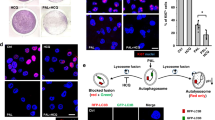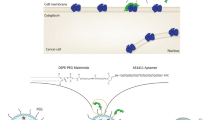Abstract
Purpose
KRAS is the most frequently mutated gene in human cancers, and ~ 90% of pancreatic cancers exhibit KRAS mutations. Despite the well-known role of KRAS in malignancies, directly inhibiting KRAS is challenging.
Methods
In this study, we successfully synthesized apolipoprotein E3-based liposomes for the co-delivery of gemcitabine (GEM) and a small interfering RNA targeting KRAS (KRAS-siRNA) to improve the efficacy of pancreatic cancer treatment.
Results
Apolipoprotein E3 self-assembly on the liposome surface led to a substantial increase in its internalization in PANC1 human pancreatic cancer cells. KRAS-siRNA led to downregulated KRAS protein expression and KRAS-dependent carcinogenic pathways, resulting in the inhibition of cell proliferation, cell cycle arrest, increased apoptosis, and suppression of tumor progression. The combination of KRAS-siRNA and GEM induced a synergistic improvement in cell apoptosis and significantly lower cell viability compared with single-agent therapy. The low IC50 value of A3-SGLP might be attributed to potentiation of the anticancer effect of GEM by siRNA-mediated silencing of KRAS mutations, thereby inducing synergistic effects on cancer cells.
Conclusion
A3-SGLP led to a marked decrease in the overall tumor burden and did not show any signs of toxicity. Therefore, the combination of KRAS-siRNA and GEM holds great potential for the treatment of pancreatic cancer.








Similar content being viewed by others
Change history
01 February 2022
This article has been retracted. Please see the Retraction Notice for more detail: https://doi.org/10.1007/s11095-022-03181-6
Abbreviations
- A3-SGLP:
-
ApoE3-conjugated SGLP
- ApoE3:
-
Apolipoprotein E3
- EPR:
-
Enhanced permeation and retention effect
- GEM:
-
Gemcitabine
- SGLP:
-
siRNA/GEM-loaded liposome
References
Siegel RL, Miller KD, Jemal A. Cancer statistics, 2016. CA Cancer J Clin. 2016;66:7–30.
Franck C, Müller C, Rosania R, Croner RS, Pech M, Venerito M. Advanced pancreatic ductal adenocarcinoma: moving forward. Cancers (Basel). 2020;12(7):E1955.
Bouchart C, Navez J, Closset J, Hendlisz A, Van Gestel D, Moretti L, et al. Novel strategies using modern radiotherapy to improve pancreatic cancer outcomes: toward a new standard? Ther Adv Med Oncol. 2020;12:1758835920936093.
Abbruzzese JL, Hess KR. New option for the initial management of metastatic pancreatic cancer? J Clin Oncol. 2014;32:2405–7.
Von Hoff DD, Ervin T, Arena FP, Chiorean EG, Infante J, Moore M, et al. Increased survival in pancreatic cancer with nab-paclitaxel plus gemcitabine. N Engl J Med. 2013;369:1691–703.
Philip PA, Benedetti J, Corless CL, Wong R, O'Reilly EM, Flynn PJ, et al. Phase III study comparing gemcitabine plus cetuximab versus gemcitabine in patients with advanced pancreatic adenocarcinoma: Southwest Oncology Group-directed intergroup trial S0205. J Clin Oncol. 2010;28:3605–10.
Gillson J, Ramaswamy Y, Singh G, Gorfe AA, Pavlakis N, Samra J, et al. Small molecule KRAS inhibitors: the future for targeted pancreatic Cancer therapy? Cancers (Basel). 2020;12(5):1341.
El Osta B, Behera M, Kim S, Berry LD, Sica G, Pillai RN, et al. Characteristics and outcomes of patients with metastatic KRASmutant lung adenocarcinomas: the lung Cancer mutation consortium experience. J Thorac Oncol. 2019;14:876–89.
Witkiewicz AK, McMillan EA, Balaji U, Baek G, Lin WC, Mansour J, et al. Whole-exome sequencing of pancreatic cancer defines genetic diversity and therapeutic targets. Nat Commun. 2015;6:6744.
Waters AM, Der CJ. KRAS: the critical driver and therapeutic target for pancreatic Cancer. Cold Spring Harbor Perspect Med. 2018;8:1–17.
Bournet B, Muscari F, Buscail C, Assenat E, Barthet M, Hammel P, et al. KRAS G12D mutation subtype is a prognostic factor for advanced pancreatic adenocarcinoma. Clin Transl Gastroenterol. 2016;7:e157.
Ryan MB, Corcoran RB. Therapeutic strategies to target RAS-mutant cancers. Nat Rev Clin Oncol. 2018;15:709–20.
Zheng N, Song Z, Yang J, Liu Y, Li F, Cheng J, et al. Manipulating the membrane penetration mechanism of helical polypeptides via aromatic modifcation for effcient gene delivery. Acta Biomater. 2017;58(8):146–57.
Luo X, Peng X, Hou J, Wu S, Shen J, Wang L. Folic acid-functionalized polyethylenimine superparamagnetic iron oxide nanoparticles as theranostic agents for magnetic resonance imaging and PD-L1 siRNA delivery for gastric cancer. Int J Nanomedicine. 2017;12(7):5331–43.
Xue W, Dahlman JE, Tammela T, Khan OF, Sood S, Dave A, et al. Small RNA combination therapy for lung cancer. Proc Natl Acad Sci U S A. 2014;111:E3553–61.
Pecot CV, Wu SY, Bellister S, Filant J, Rupaimoole R, Hisamatsu T, et al. Therapeutic silencing of KRAS using systemically delivered siRNAs. Mol Cancer Ther. 2014;13:2876–85.
Ramasamy T, Munusamy S, Ruttala HB, Kim JO. Smart Nanocarriers for the Delivery of Nucleic Acid-based Therapeutics: A Comprehensive Review. Biotechnology Journal. In press, 2020. Biotechnol J. 2020;e1900408.
Kim HK, Davaa E, Myung CS, Park JS. Enhanced siRNA delivery using cationic liposomes with new polyarginine-conjugated PEG-lipid. Int J Pharm. 2010;392:141–7.
Ramasamy T, Ruttala HB, Kaliraj K, Poudel K, Jin SG, Choi HG, et al. Polypeptide derivative of metformin with the combined advantage of a gene carrier and anticancer activity. ACS Biomaterials Science & Engineering. 2019;5(10):5159–68.
Ramasamy T, Ruttala HB, Gupta B, Poudel BK, Choi HG, Yong CS, et al. Smart chemistry-based nanosized drug delivery systems for systemic applications: a comprehensive review. J Control Release. 2017;258:226–53.
Li J, Chen YC, Tseng YC, Mozumdar S, Huang L. Biodegradable calcium phosphate nanoparticle with lipid coating for systemic siRNA delivery. J Control Release. 2010;142:416–21.
Zhou S, Huang Y, Chen Y, Liu S, Xu M, Jiang T, et al. Engineering ApoE3-incorporated biomimetic nanoparticle for efficient vaccine delivery to dendritic cells via macropinocytosis to enhance cancer immunotherapy. Biomaterials. 2020;235:119795.
Neves AR, Queiroz JF, Lima SAC, Reis S. Apo E-functionalization of solid lipid nanoparticles enhances brain drug delivery: uptake mechanism and transport pathways. Bioconjug Chem. 2017;28(4):995–1004.
Croy JE, Brandon T, Komives EA. Two Apolipoprotein E mimetic peptides, ApoE(130−149) and ApoE(141−155)2, bind to LRP1. Biochemistry. 2004;43:7328–35.
Chen X, Zhang Y, Tang C, Tian C, Sun Q, Su Z, et al. Co-delivery of paclitaxel and anti-survivin siRNA via redox-sensitive oligopeptide liposomes for the synergistic treatment of breast cancer and metastasis. Int J Pharm. 2017;529:102–15.
Eser S, Schnieke A, Schneider G, Saur D. Oncogenic KRAS signalling in pancreatic cancer. Br J Cancer. 2014;111:817–22.
Son J, Lyssiotis CA, Ying H, Wang X, Hua S, Ligorio M, et al. Glutamine supports pancreatic cancer growth through a KRAS-regulated metabolic pathway. Nature. 2013;496:101–5.
Acknowledgments and disclosures
This study was supported by Zhejiang science and technology department public welfare project (No: 2017C33130), Zhejiang administration of traditional Chinese medicine key research project (No: 2018ZZ004), Zhejiang provincial commission of health and family planning project (No: 2019317717).
Author information
Authors and Affiliations
Corresponding author
Additional information
Publisher’s Note
Springer Nature remains neutral with regard to jurisdictional claims in published maps and institutional affiliations.
This article has been retracted. Please see the retraction notice for more detail: https://doi.org/10.1007/s11095-022-03181-6"
Electronic supplementary material
ESM 1
(PDF 8 kb)
About this article
Cite this article
Wang, F., Zhang, Z. RETRACTED ARTICLE: Nanoformulation of Apolipoprotein E3-Tagged Liposomal Nanoparticles for the co-Delivery of KRAS-siRNA and Gemcitabine for Pancreatic Cancer Treatment. Pharm Res 37, 247 (2020). https://doi.org/10.1007/s11095-020-02949-y
Received:
Accepted:
Published:
DOI: https://doi.org/10.1007/s11095-020-02949-y




